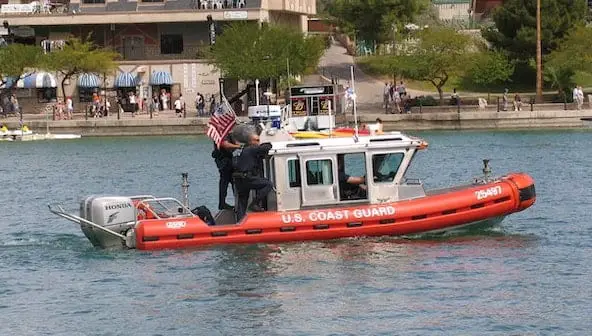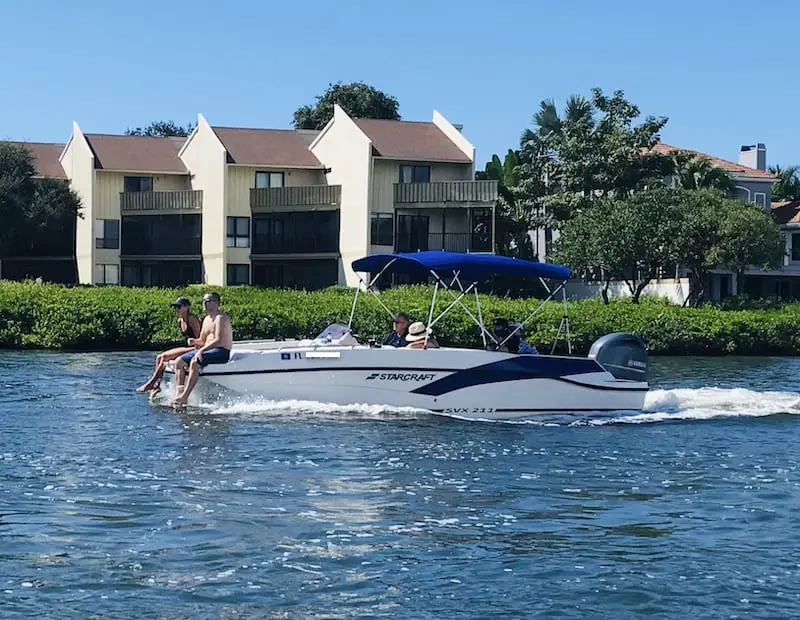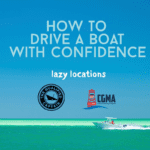Whenever I’m on the water in Florida, I routinely see boaters unaware that they’re breaking laws. In some cases they are also exposing themselves to incredible liability. These are 5 important boating laws that you may not know exist.
#1 THE CAPTAIN IS RESPONSIBLE FOR EVERYONE’S SAFETY
As the captain of a vessel, he or she is responsible for making sure everyone on board remains safe. If a passenger drinks too much at the sandbar and hurts themselves or others, or falls overboard, it’s ultimately the captain who will be held accountable. In addition, if the captain damages coral or seagrass he may face significant liability. The captain’s responsibility cannot be over emphasized.
#2 YOU ARE RESPONSIBLE FOR ANY DAMAGE FROM YOUR WAKE
The ramifications of not understanding this responsibility are huge. We’ve all see the big day cruiser barreling through the channel while not showing any consideration for the smaller boats in its’ wake. This is often the cause for smaller boats to become swamped or capsize. In some cases, a huge wake can also cause injury or death. However, the most common ramification of huge boat wakes is damage to docked boats. If your wake causes this, you are ultimately responsible.
10 TIPS TO MAKE YOUR BOATING BETTER
#3 FLORIDA BOAT OPERATORS UNDER 21 ARE AT HUGE RISK FOR BUI
For those who don’t know, you are allowed to have alcohol on a boat. However, only the operator cannot be “drunk”. For those over 21 that means not blowing a .08 (roughly equivalent to three drinks). For those under 21, the “drunk” threshold is much lower. They only have to blow a .02 (roughly equivalent to one drink)! Of course, anyone under 21 shouldn’t be drinking at all. That being said, there are tons of teenagers and college kids who take out their parents boats. Consequently, the operator is only one drink away from a potentially, life-altering consequence.
#4 IN ORDER FOR INFLATABLE LIFEJACKETS TO COUNT THEY MUST BE WORN
In the case of traditional life jackets (PFDs), you only have to have enough of them on board for every passenger and they can be stored anywhere that provides convenient access. However, that rule changes significantly when using inflatable life jackets. For these pfd’s to count you must have them on! Therefore, throwing a few in the front locker won’t do you any good if you get pulled over. More importantly, not wearing one won’t also do you any good if you fall overboard.
#5 BOW RIDING CAN BE ILLEGAL AND DANGEROUS
This is probably one of the most commonly broken laws seen on the water. On any given day, you’ll likely see numerous boats with passengers on the bow dangling their feet over the side. While there’s no denying it’s thrilling and fun, it’s also extremely dangerous and against the law. It’s very easy to fall overboard or slip under the bow rail after hitting a wake or running aground. The consequence of that would almost certainly result in the passenger being run over by the boat and either being injured or killed.
***UPDATE*** Bow Riding in Florida is actually NOT against the law anymore due to HB 703 passed in 2016. The new law states that you can’t be ticketed for it. Leave it up to the politicians to make bad decisions. Bow riding is still illegal in many other states and in federal waters. Regardless, it’s still an extremely unsafe action and exposes the vessel operator to liability should something happen — especially, if the victim isn’t a family member.
Boating is one of the most enjoyable leisure activities that exists. That being said, it’s also potentially, one of the worst if you don’t understand all the boating laws.






